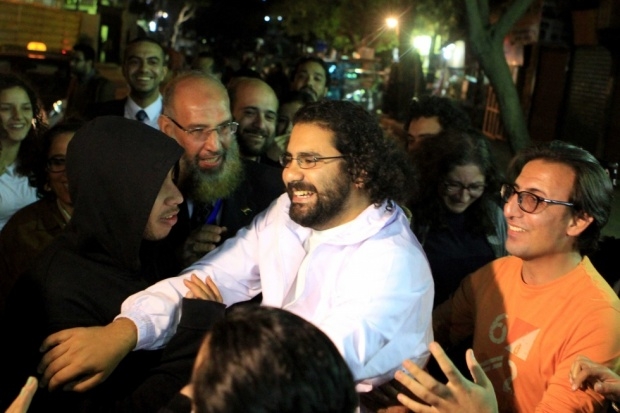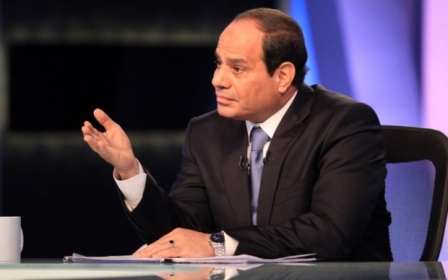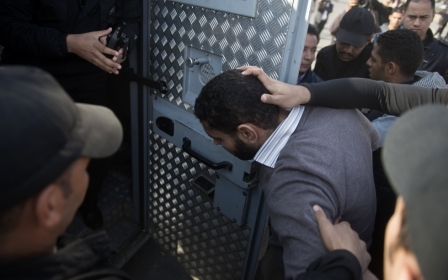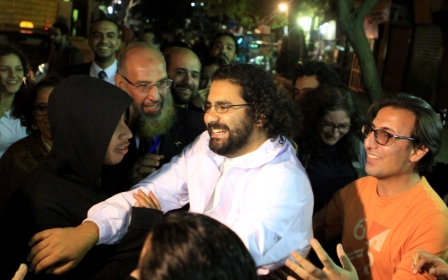Egypt's revolutionary youth fear repression under Sisi

By Haitham El-Tabei
CAIRO - After having spearheaded a 2011 uprising that toppled Egypt's strongman and former air force chief Hosni Mubarak, many young revolutionaries are now in jail and an ex-army chief is about to become president.
Their dramatic reversal in fortunes could well presage a return to the repression of the Mubarak era, activists fear.
Abdel Fattah al-Sisi, who overthrew elected Islamist president Mohamed Morsi last July, is expected to sweep the 26-27 election amid a clamour for a new strongman to restore stability.
Sisi, who had been Mubarak's military intelligence chief before Morsi fatefully made him army chief, toppled the Islamist with the approval of millions of protesters, including some of the revolutionary youth.
New MEE newsletter: Jerusalem Dispatch
Sign up to get the latest insights and analysis on Israel-Palestine, alongside Turkey Unpacked and other MEE newsletters
The ouster set off the bloodiest period in the country's recent history, with a crackdown on Islamists now extending to secular activists.
A court has sentenced three other leading activists, including Ahmed Maher, to three years in prison for violating a restrictive demonstration law.
Alaa Abdel Fattah, a symbol of the revolt against Mubarak, is on trial on similar charges.
And last month a court banned Maher's April 6 youth movement which helped engineer the anti-Mubarak uprising.
'Worse than the Mubarak regime'
"Sisi's presidency will not return (Egypt) to the Mubarak era, it will be worse than the Mubarak regime," Abdel Fattah, who opposed Morsi's presidency, told AFP as he arrived at a Cairo court for a session of his trial last week.
For Abdel Fattah, the result of the election to be contested next Monday and Tuesday was a "foregone conclusion" and Sisi "already the de facto power" in Egypt.
He said he would vote for Sisi's only rival, Hamdeen Sabbahi, a veteran leftist leader and sole challenger to the former military commander.
In the almost 11 months since Morsi was ousted by Sisi, more than 1,400 people have been killed in a police crackdown on the Islamist's supporters.
More than 15,000 supporters of Morsi have also been jailed, while hundreds of them have been sentenced to death after speedy trials.
The repression has extended to secular-leaning youth groups which demonstrated against a protest law which bans all but police-sanctioned rallies.
The April 6 movement has called for a boycott of what it called a "cosmetic" election.
"Egypt has found a military president," joked Amr Ali, a leader of the youth group.
"It's back to the era of repression," he said, standing few metres (yards) from the iconic Tahrir Square, where hundreds of thousands of demonstrators protested for 18 days in early 2011 to oust Mubarak.
Now only Sisi supporters are authorised to hold rallies at the square, with the roundabout becoming increasingly inaccessible for other groups.
'Dead or behind bars'
Mahienour el-Massry, a prominent activist from Egypt's second city of Alexandria, said she too would vote for Sabbahi.
Massry has been sentenced to two years in prison for taking part in a protest.
"Sisi embodies the security state. He is a man from intelligence and (represents) everything that is against the revolution," she said before she started to serve her sentence on Tuesday.
Like Abdel Fattah, she opposed Morsi but wanted the Islamist removed "by the people and not the army" in early elections.
Now she rejects the military's return to power, something young activists opposed in 2011 when a junta including Sisi took power in the period between Mubarak's fall and Morsi's election in June 2012.
Last January, the interim government held a referendum on a new constitution. It was approved overwhelmingly, but many youths stayed at home.
The youth activists are also facing a smear campaign in the Egyptian media which accuses them of "collaborating with foreign countries".
Activist Moustafa al-Naggar, who was elected as an independent to parliament in 2011, said he seeks to "spread revolutionary politics" to re-galvanise those who revolted against Mubarak.
"The goal is to create a front of all revolutionary forces against Sisi," said Naggar, who also plans to vote for Sabbahi.
Sisi has said that "talk of freedoms" cannot take precedence over "national security" or rebuilding Egypt's battered economy.
He has, however, sought to ease concerns of youth activists by praising them in interviews and trying to assure them that the new constitution guarantees democracy and freedoms.
Middle East Eye delivers independent and unrivalled coverage and analysis of the Middle East, North Africa and beyond. To learn more about republishing this content and the associated fees, please fill out this form. More about MEE can be found here.




